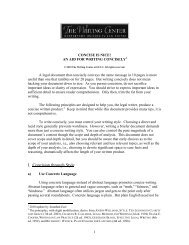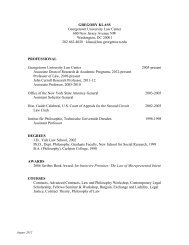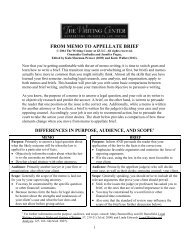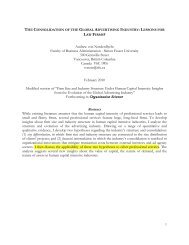Date: April 12, 2013 Topic: The Shrinking ... - Georgetown Law
Date: April 12, 2013 Topic: The Shrinking ... - Georgetown Law
Date: April 12, 2013 Topic: The Shrinking ... - Georgetown Law
Create successful ePaper yourself
Turn your PDF publications into a flip-book with our unique Google optimized e-Paper software.
General Counsel with Power? 2011 <br />
confidence, and train them up to look for issues that matter.’ Thus, engineers are encouraged to <br />
negotiate contracts and deal with clients directly without a lawyer involvement. <br />
In financial services, also, documentation work is pushed down to non-‐lawyers working in the relevant <br />
business departments. According to one general counsel, ‘I’d like to get into the business of templating <br />
things and give them to the business function. … Let’s be honest. <strong>Law</strong>yers are not good at providing <br />
either systems or process or handling volume.’ Derivatives documentation is a good case in point, as the <br />
sheer volume of work often creates bottlenecks in workflow. It is now common practice for non-‐lawyers <br />
-‐-‐ called document analysts or documentation specialists – to handle derivatives documentation, often <br />
at captive (i.e. in-‐house) offshore or nearshore centres. Investment banks are in the business of creating <br />
new financial products that are initially complex, low volume and high margin. But they commoditize <br />
them and turn them into high volume, lower margin work. <strong>Law</strong> firms may be involved in early stages, <br />
but when the work becomes a repeat exercise, banks have an incentive to internalize them eventually. <br />
De-‐lawyering, therefore, appears to be a cyclical trend, most evident during the mature stage of legal <br />
product lifecycles. <br />
Who Manages the Reassembly? <br />
Multi-‐sourcing – including outsourcing and offshoring – requires someone to take a lead in supervising <br />
and managing a variety of providers. Just as making an aeroplane requires systems integration by the <br />
aircraft manufacturer to manage the final assembly of engines, wings, and fuselage made by different <br />
suppliers, we would expect an ‘architect’ to manage the integration – final assembly – of disaggregated <br />
legal tasks so the final ‘product’ works and is delivered seamlessly to the client. But which entity should <br />
assume this architecting role? Should it be the law firm or the in-‐house legal department? <strong>The</strong> answer <br />
to that question is almost the Holy Grail to gauging the future shape of legal services markets. <strong>The</strong> <br />
picture that emerges from this study is far from clear cut. <br />
When asked if their law firms use outsourcing or offshoring, some general counsel responded that they <br />
did not know, and that it was up to the law firms to decide. A general counsel at a bank stated: ‘our <br />
preference is to deal directly with law firms and for them to outsource to the alternative providers if <br />
they choose in order to drive their costs down to us. We want those firms to be responsible for <br />
managing that. I am not keen to deal with people in other jurisdictions who may not have the same <br />
requirement as us in confidentiality and security of information. We’d like to place the onus on the <br />
major law firms we deal with to ascertain that for us.’ <br />
An alternative approach, adopted by a small number of general counsel, was to instruct law firms to <br />
disaggregate and to use a specific LPO provider for work chunked out, such as data room management, <br />
e-‐discovery (e-‐disclosure) work, and contract review. <strong>The</strong> in-‐house department would have a direct <br />
contractual relationship with such a provider. Delegating decisions on what to outsource/offshore to law <br />
firms would not work because ‘you effectively run the risk of delegating the control of what needs to be <br />
done, which inevitably ends up being more expensive’, according to a general counsel. <br />
21 <br />
Said Business School | University of Oxford
















